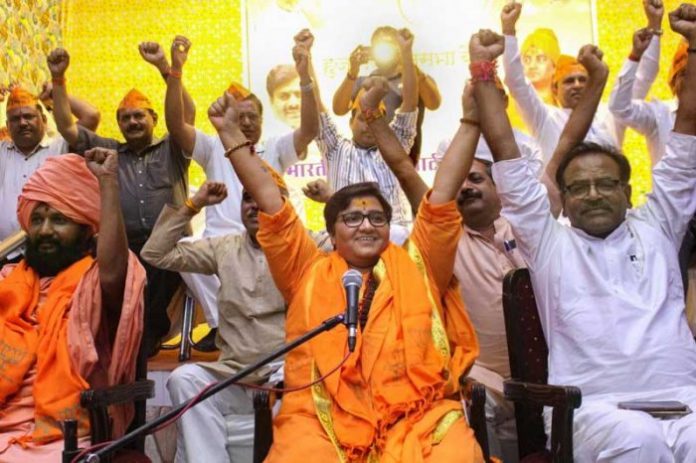
By Arif Hussain
Recently an old friend, an urbane corporate worker, mused on Facebook that what is it about this election that’s making it difficult for anti-BJP people to remain friends with BJP voters? It got me thinking and I could deduce two factors that didn’t exist in earlier elections, at least at this scale.
Private thoughts are now Public
We have known for some time now that the NSA and other intelligence agencies, using sophisticated algorithms, mine social media profiles to create maps of social connections. But to know the views of SM users we don’t need any hi-tech algorithm.
Facebook, Twitter, Instagram, and other such platforms have made it extremely easy to broadcast our views but at the same time have made it difficult to compartmentalise them.
Earlier, one could express their communal and casteist views in private but in public settings talk cosmopolitan and appear progressive. But now through online activities, not only through ‘Posts’ but also through ‘RTs’, ‘Share’, ‘Like’, ‘Following’, ‘Comment’ and ‘Reply’, etc., it’s possible to gauge somebody’s socio-political leanings even if they are not direct about it. More people joining social media platforms, especially close friends and family members, make it an even more attractive option for communication, exposing more of private views in public. Furthermore, the echo-chambers of social media amplifies these views when interacting with friends of similar leanings which are also visible to friends who don’t ascribe to such views.
The same friend whose question prompted this piece was ecstatic in March 2017, when Adityanath was anointed the CM of U.P. and in a comment (not a post), claimed that no matter what, Modi will be PM till at least 2024. Such instances give a clear indication of political leanings, even if users are not direct about it, and it is becoming increasingly difficult to hide them unless the user is very diligent.
BJP supporters have lost the Mukhauta (Mask)
During earlier election cycles, for middle-class urban supporters of BJP, for every Advani or Togadia, there was a Vajpayee to save face. A Vajpayee wouldn’t be present in Ayodhya on December 6, 1992, and then say in an interview “In Ayodhya something happened which should not have happened..” or along with saying, “Muslims everywhere make trouble and cannot live in peace with their neighbours…”, he will advise Narendra Modi to follow the Rajdharma. This enabled the urbane BJP voter to assert that BJP is not a rabid communal party and people like Vajpayee keep the communal loonies in check.
To save this image, even a Advani had to say that December 6, 1992, was the saddest day of his life and Jinnah was “secular” and an “ambassador of Hindu-Muslim unity”. For Modi’s 2014 campaign, even with the communal rhetoric, the loudest slogan was Sabka Saath, Sabka Vikas. This Janus-faced approach provided a convenient cover for middle-class urban BJP supporters when interacting with their non-BJP supporter friends.
That cover doesn’t exist anymore.
With the rise of Modi-Shah-Adityanath, and their numerous underlings, who are unambiguously direct about their communal politics, middle-class urban BJP supporters can’t deny anymore that communal politics is the bread and butter of BJP. After all how could anybody say that BJP is not virulently anti-Muslim when Modi during the state election campaign in Bihar and U.P regularly talked about Qabristan-Shamshaan, and Ramzaan-Diwali, or a, then future CM, Adityanath says that in lieu of one Hindu girl converting to Islam, we will convert 100 Muslim girls to Hinduism, or as a CM, he makes multiple remarks about Ali and Bajrang Bali. Equally difficult is to defend BJP President Amit Shah when, on NRC, he says “Will remove every single infiltrator, except Buddhists, Hindus and Sikhs”, a direct reference to Muslim exclusion. BJP’s decision to field terror-accused Pragya Singh Thakur from Bhopal is another such example.
On the other hand, issues like 100 Smart Cities or millions of jobs are not even finding mention in Modi’s speeches, which are all now about Pakistan and revenge.
These developments leave no doubt that any middle-class urban voter who is still voting for BJP, their motivation, first and foremost, is communal and only then anything else.
So the response to my friend: Non-BJP supporters can’t be friends with BJP supporters anymore because by continuing to support the BJP they have exposed themselves as communal bigots just like the “supreme leader” they worship.
(Arif Hussain grew up in Patna and lives in Cambridge, Massachusetts. A socio-political activist and analyst, he divides his time between community organizing, research, and writing on contemporary issues.)

